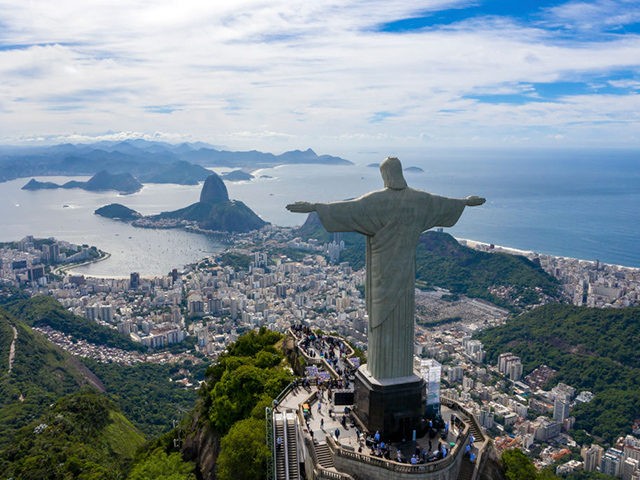The two largest cities in Brazil, Sao Paulo and Rio de Janeiro, are implementing curfews and business lockdowns in the face of consecutive record-high death rates in the past several days, peaking with 1,840 deaths tied to the Chinese coronavirus on Wednesday.
Conservative President Jair Bolsonaro has vocally rejected the use of economic lockdowns to limit the spread of the virus, arguing that the Chinese coronavirus is “a little cold” and insisting that deliberately hurting the national economy would add to the pain of the pandemic rather than ease it. Bolsonaro tested positive for coronavirus last summer and recovered without the need for hospitalization in three weeks.
As Brazil operates on a federal system, Bolsonaro’s personal objections to lockdowns do not prevent mayors or governors from limiting the economic activity under their purview. Left-leaning local and regional leaders have repeatedly challenged Bolsonaro with lockdowns, mask mandates, and other provisions, most prominently the governor of Sao Paulo, Joao Doria.
The return to strict limitations in Rio de Janeiro and Sao Paulo appear contrary to easing limitations around the world, including the United States, in response to declining infection rates and increasing numbers of fully vaccinated people. Brazil has administered at least one dose of a Chinese coronavirus vaccine to 7.3 million people, though most of those receiving doses are in inland Amazonas state, on the other side of the coastal metropolises.
Brazil is home to one of several increasingly pervasive variants of the original Chinese coronavirus, believed to have originated in Amazonas.
Brazil’s O Globo reported on Thursday that Rio de Janeiro City Hall issued new ordinances that limit the hours during which bars and restaurants may operate and impose a curfew between the hours of 11 p.m. and 5 a.m. Residents will not be able to use the city’s iconic beach or waterfront, nor will businesses be allowed to open there. Bars and restaurants must end in-person service by 5 p.m. but may be allowed to open through 8 p.m. if not serving indoors. They will only be allowed to reach 40 percent capacity. Night clubs, parties, and other events are completely banned.
The provisions will last through at least March 11.
In Sao Paulo, Governor Doria announced Wednesday that all cities in the greater Sao Paulo state will be placed on “red alert” as of Saturday, which places the strictest limitations on individual and business rights. “Non-essential” businesses, as defined by the government, will be forced to shut down entirely. Curfew statewide will begin at 8 p.m. Doria did not, however, shut down schools or churches, unlike other governments around the world. The provisions will last through March 19.
Doria used the announcement regarding the new provisions to attack Bolsonaro, blaming him directly for the increase in coronavirus deaths in the country.
“This is your fault. It’s because of your denialism,” Doria said in a press conference, addressing Bolsonaro. “More than 1,000 people are dying every day in Brazil. It’s like five plane crashes a day. … Many of the Brazilians who have been buried died because you didn’t do what you were supposed to: lead.”
Doria claimed Sao Paulo’s healthcare system was on the brink of collapse due to high numbers of hospitalizations, again blaming Bolsonaro without addressing the role his own administration played. Brazilian political observers consider Doria the top rival to challenge Bolsonaro in the 2022 election, though he has yet to officially declare himself a presidential candidate.
Wednesday was the fifth consecutive day that Brazil broke its own one-day coronavirus death record, suggesting a rapidly growing rate of infection among people more likely to suffer severe cases. As a Southern Hemisphere nation, it is currently entering its autumn season, also indicating that it had experienced a summer decline in the past few months. The left-wing Folha de Sao Paulo newspaper also noted this week that public health experts have seen a close link between high rates of obesity in a country and high numbers of coronavirus deaths. About 22 percent of Brazilians fall within weights considered “obese,” while over half are technically overweight.
Studies comparing country-by-country coronavirus infection and death rates are necessarily imperfect as they rely on the governments themselves to provide honest data. Studies have found that rogue states like China, Russia, and Iran appear to be severely undercounting the number of coronavirus cases and deaths in their respective countries. Impoverished countries also have less access to accurate testing, which may be accounting for their low case numbers.
At press time, Brazil has documented nearly 11 million coronavirus cases and 259,271 deaths, more deaths than any nation except the United States, not taking into account the high likelihood that China and Russia, in particular, may have experienced far more deaths than those in their official statistics.
Vaccination, which has led to easing restrictions in some parts of the world, has been a subject of heated political debate in Brazil. Doria has publicly supported mandating coronavirus vaccination, a position that Bolsonaro has staunchly rejected. Bolsonaro also opposed importing “Coronavac,” a Chinese coronavirus vaccine candidate that rated only about 50 percent effective in preventing infection, before ultimately announcing in January that, failing to secure other vaccine products, Brasilia had agreed with Beijing to import ingredients to product “Coronavac” domestically.

COMMENTS
Please let us know if you're having issues with commenting.